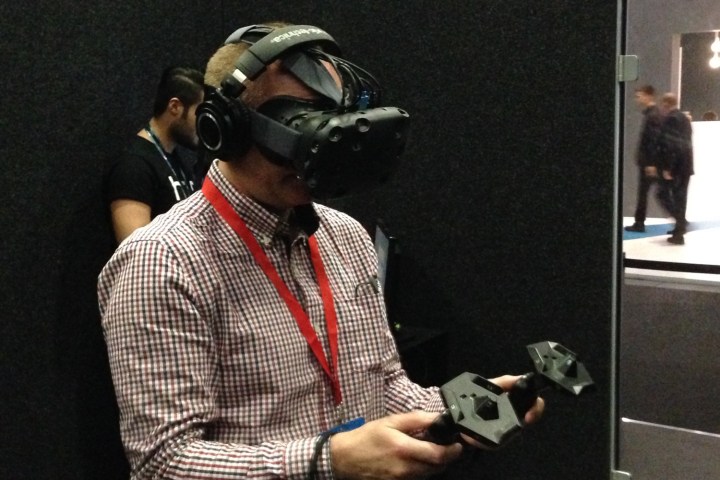
No longer is HTC banking on it’s next flagship smartphone to turn the company around. It’s putting the majority of its efforts into its virtual reality headset, the HTC Vive. HTC CEO Vera Wang told the Telegraph, “Virtual reality is something people have talked about for 20, 30 years, in movies, in books and finally it is real. VR has been on our minds for a long time, and now HTC has made virtual reality real.”
HTC is entering an unknown race with fierce competition from the likes of Oculus and Sony, as well as lower cost alternatives like the Gear VR and Google Cardboard. However, the Vive, built from a partnership with gaming company Valve, has something unique. The competition mostly has fixed-point experiences, while Vive users will be able to walk through and explore virtual worlds.
HTC also claims that nausea won’t be an issue because of its low latency, and the company recently announced a new front-facing camera that allows users to switch between real and virtual worlds.
The Taiwanese company will continue to make smartphones, but the emphasis has already faded and likely to drift further. Wang said, “Yes, smartphones are important, but to create a natural extension to other connected devices like wearables and virtual reality is more important.”
HTC was one of the top handset makers in the world from the late 90’s up until 2012, when things went wrong. When asked about why, Wang said, “I think the problem was competition — Apple, Xiaomi, these companies spend tons of money on communications and marketing, they pump a huge amount of investment into the market. There are a lot of Chinese competitors.” Interestingly enough, she didn’t mention Samsung, who spends a ton of money marketing its products.
This leads us to the big question: Can HTC thwart the competition this time around? Marketing is essential for any product’s success. How can HTC succeed if it’s unwilling or unable to effectively market the Vive? It’s not like HTC will be competing with no-name brands. Sony, Facebook, Oculus, Microsoft, and Google are all well known names with deep pockets.
The Oculus Rift is already available for pre-order for $600, and the HTC Vive will follow suit on February 29. The price is unknown, but it’s unlikely to cost less.
Editors' Recommendations
- This new VR headset beats the Vision Pro in one key way and is half the price
- Your Quest 3 just got so much better — for free
- These are all the must-try apps for your Meta Quest 3
- What’s behind customers returning their Vision Pro headsets?
- You really do not want to forget your Vision Pro passcode


